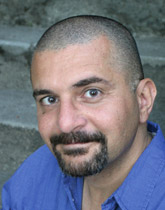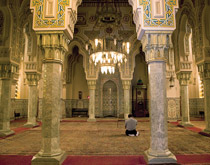
Yussef El Guindi must learn how to assimilate. Born in Egypt in 1960; raised in England; schooled in France, the Middle East, and the United States; he has been a constant immigrant. Part of him knows he lacks something, a touchstone of sorts. He wants to write and, in 1986, earns his master's degree at Carnegie Mellon, majoring in playwriting. He says it helps him focus, but he still finds himself churning out commercial fare that he thinks theaters will buy. He'd rather be delving into Arab American plots but worries there isn't an audience.

But the 1990s bring what he describes as a "renaissance" for Middle Eastern artists. Thanks to the Web, he finds a community of Arab American writers, theaters, and actors. And he becomes an American citizen. Standing in a room of strangers, in his adopted hometown of Seattle, El Guindi feels "a part of something." The experience also crystallizes what sort of plays he wants to write. His concentrates on the immigrant experience, and the plays flow from him, widely received across the country. Until 9/11.
He hears of backlash—a friend's brother is even killed in Atlanta. Will the Arab-based stories he tells be blackballed, or will a sense of fairness and understanding that democracy stands for ultimately prevail? It's a question not yet fully answered for him, and it's that struggle he wants to capture on stage. El Guindi recently won the 2010 Middle East American Distinguished Playwright Award, and the $10,000 commission will enable the playwright to voice the angst and joy of Arab American life. —Elizabeth Shestak (HS'03)



